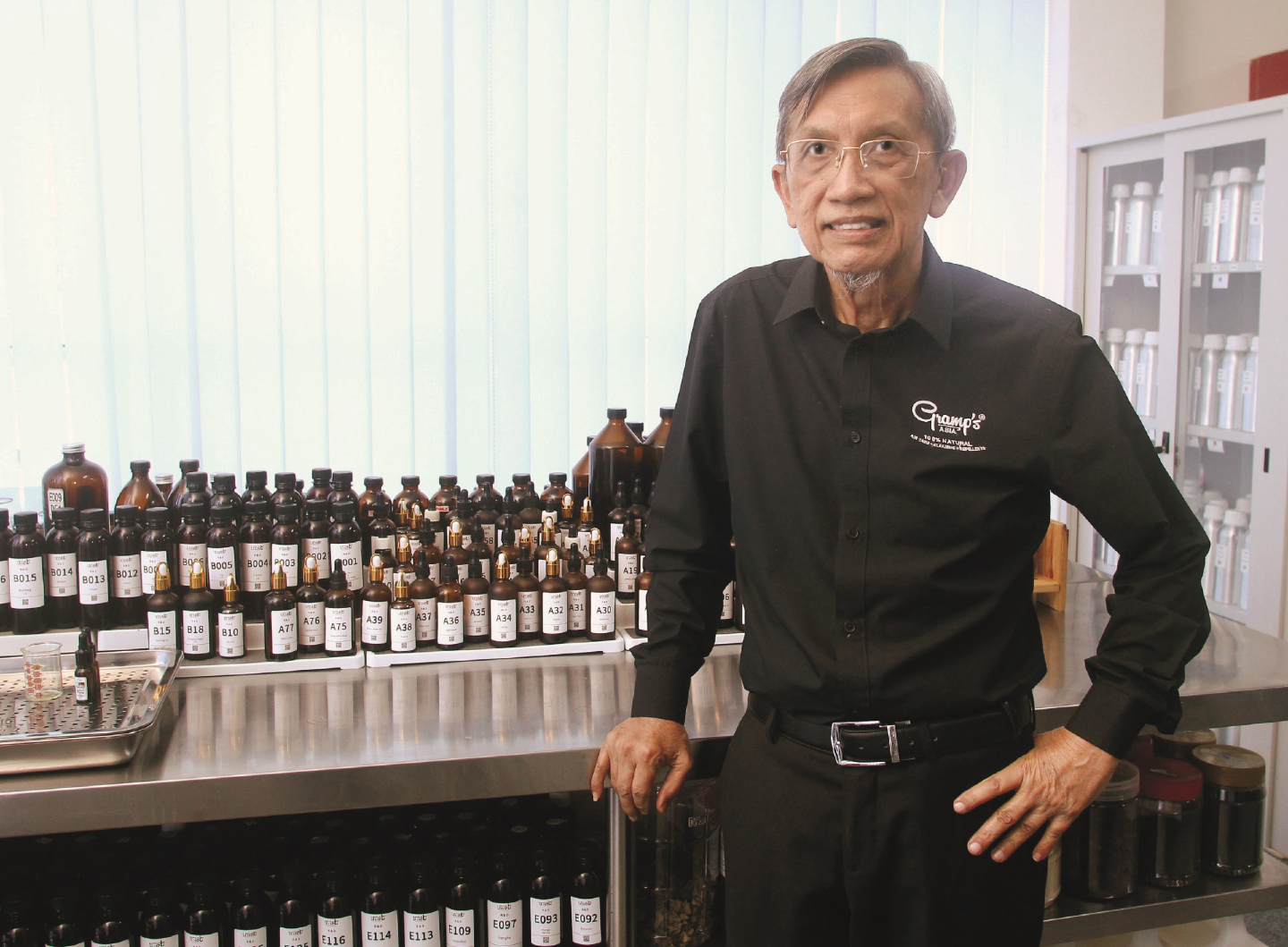
Those who know Nor Rezan Mohamad Noor affectionately refer to him as “Tok Ayah” (Photo: Kenny Yap/The Edge)
It took a pandemic to rouse the world from its selfish slumber. After decades spent chasing dollars, racking up air miles and traipsing the world carelessly, the ensuing border closures and months of self-confinement at home have reawakened an awareness of the mortal importance of health and home. And unless one owns a sprawling country pile, it is safe to assume that many have had to make do with living, working and playing en famille in a space that averages 1,600 sq ft for months on end.
This Covid-impacted lifestyle change has forced us, masked and gloved, to relook the way we live. Truth be told, Malaysians are fortunate to be surrounded by the richness of nature. The tropical rainforest is acknowledged to be the richest repository of the world’s healing and medicinal herbs, and the healing properties of a dizzying array of indigenous botanicals are at our fingertips, waiting for the person with the right knowledge to come along and harness them to create treatments and cures for quite possibly every ailment on earth.
Enter Nor Rezan Mohamad Noor. Those who know him affectionately refer to him as “Tok Ayah”, a kindly term that denotes fatherly kinship. At 70, the founder and product creator of Gramp’s Asia — a brand of 100% natural air care, cleaning products and repellents — is just getting started on the second phase of his career. Having retired in 2009 after 33 years of service with the Penang Municipal Council as its chief public health inspector, Tok Ayah now spends his days immersed in his original passion: the research of herbs and plants and the creation of natural remedies to solve everyday woes and grievances.
20210318_peo_gramps_asia_11_ky_1.jpg
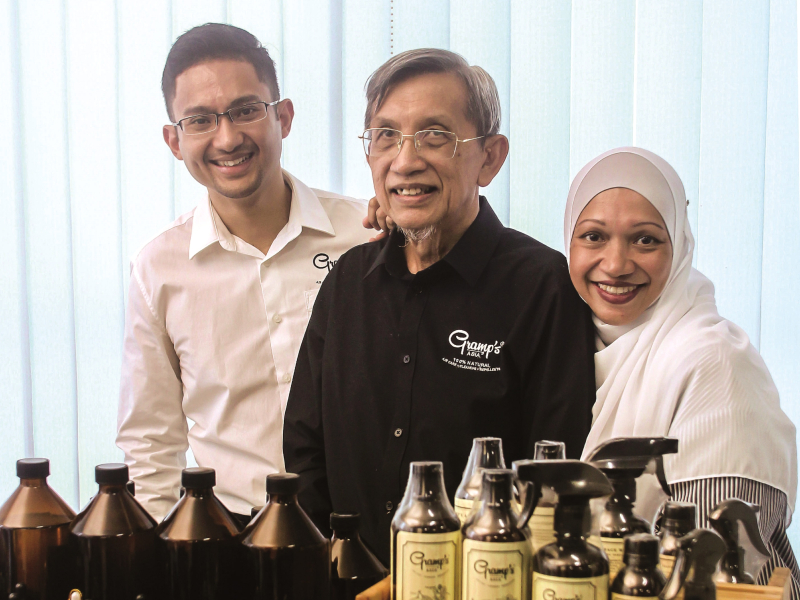
Those familiar with the story of Gramp’s beginnings know that it was one of Tok Ayah’s five grandsons who served as the catalyst for the company’s inception. “Tok Ayah had always pottered about with oils and experiments with herbs, but everything came to a head after Danish, now 17, developed an adverse reaction to mosquito bites,” says his daughter Eza Feizaty, who serves as director of marketing and communications at Gramp’s Asia.
Blessed with a lifetime of knowledge and an innate skill of herbalism, Tok Ayah set about formulating an all-natural, water-based mosquito repellent that is now one of the company’s best-selling and most-iconic products: Bye-Bye Nyamuk. “I was once told by a religious teacher, ‘Do not go against God’,” says Tok Ayah. “God created all the things around us, including all the animals mentioned in the Quran. God also created everything in pairs. For every negative, there is a positive. So, He who created mosquitoes would also have provided a remedy to repel it. The answer is around you, he told me. So I heeded his advice and started searching for what God would have provided as protection for us.”
The second impetus to set up Gramp’s Asia came about after Tok Ayah’s wife passed away in 2015. “We wondered how he was going to occupy his time,” says Eza. “I was working in marketing and human resources, but left my job in 2016 to join Gramp’s.” Joining his sister a year later was Reza Fikry, now CEO of Gramp’s Asia. “I was working as an assistant finance manager and doing financial planning for others,” he points out. “I thought, ‘Why not do it for my own family, our business?’ The early days, though, were really scary.”
20210318_peo_gramps_asia_8_ky_1.jpg
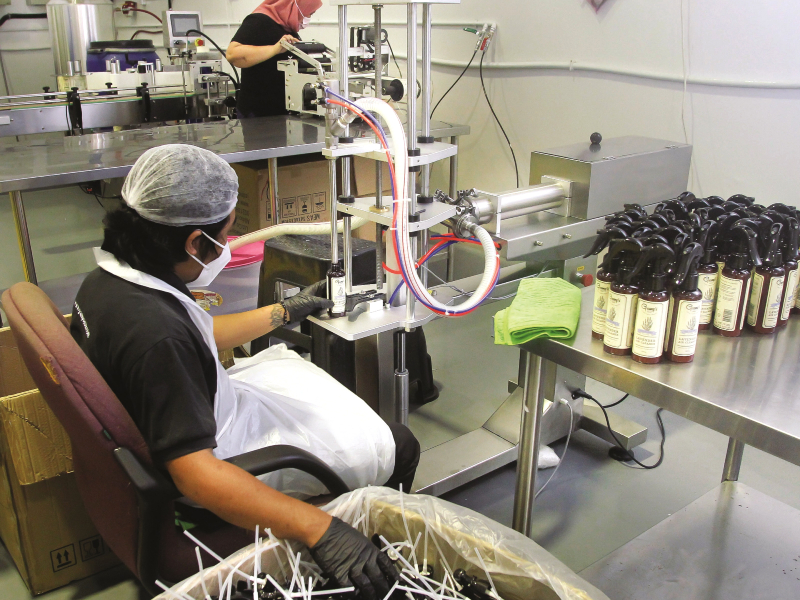
With an unwavering commitment to formulate products that are natural, water-based and safe for humans, pets and the environment, Gramp’s Asia is all geared up for expansion, with an aspiration to be present in all the households in Malaysia. It is a self-funded family enterprise, with seed money of RM300,000 pooled from various sources to establish a factory in Puchong in 2016.
Housed in a 4,000 sq ft building on 10,000 sq ft of land, the set-up is small but with ample room to grow. A tour of its R&D area is like walking into a technical cabinet of curiosities. Rack upon rack of drying herbs are labelled with the most exotic names. There is Kucing Galak, a type of local catnip; Daun Bidara or Indian jujube that is said to repel djinn; Pecah Kaca, a medicinal herb that is said to help in the treatment of cancer and diabetes; and Manjakani, a species of Asian oak. “Our production is still small, at 5,000 bottles a week, but we are planning to double that by 3Q2021,” says Reza.
Small but effective best sums up the work ethos of Gramp’s Asia. Fewer than a dozen people currently work for the company — four in production, five in management and two in administration. Many of the bottles are still filled and sealed manually, although a recent investment in automated equipment is speeding up deliveries. The company offers 12 products and what sells well varies. “We struggled to sell our surface wipe initially, but once the pandemic hit, the sales figures skyrocketed,” says Reza. “Prior to that, our best-sellers were the Bye-Bye range: Nyamuk (mosquitoes), Lipas (cockroaches) and Semut (ants).”
bye_bye_lipas.jpg
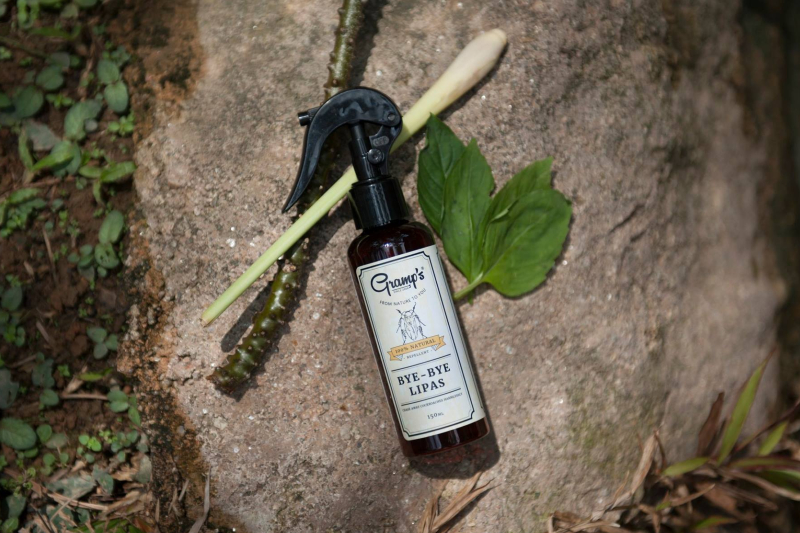
Currently stocked in more than 200 stores nationwide, from Caring Pharmacy — one of its earliest and biggest supporters — to Mothercare, Cold Storage, Watson’s and Mercato, Gramp’s Asia also ships to Singapore where Bye-Bye Cicak (house lizard) is its most popular product. To maintain and ensure optimum efficacy, all items are produced upon order. Prices are also kept affordable to ensure its safe and effective formulations are inclusive and accessible to all. “Sometimes, to prove just how safe our products are, I do this,” says Reza, squirting a spritz of surface wipe straight into his mouth. “And yet, these products work as they are all based on Tok Ayah’s herbalism expertise and decades of scientific research. You just need to try them out for yourself to see.”
Born in Taiping, Perak, Tok Ayah’s interest in the natural world was inspired by his mother, who made her own bedak sejuk and other home remedies. “You could say I inherited a gene of learning from people,” he laughs. “I also used to stay with an uncle and help him plant herbs. The house had no electricity or water supply. We bathed with water from the well and learnt very quickly to be self-sufficient. My curiosity about the world started from a very young age while my work as a public health inspector taught me to always look for the third side of the coin.
“I learnt constantly from everyone around me and, throughout my career, I was posted to many different sections so I could learn even more about different things. I studied about primates, rats and mosquitoes in my work with the health council. I was also fortunate to have had a lot of mentors throughout my career, chief of whom was Dr Lim Chong Eu,” he says, referring to the politician and former chief minister who is often credited as the architect of modern Penang.
20210318_peo_gramps_asia_4_ky.jpg
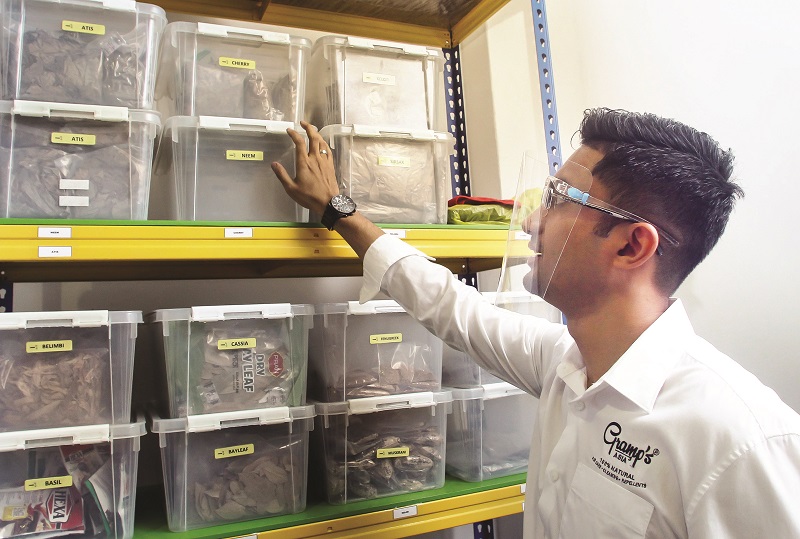
“Dad used to bring back mosquitoes in wire cylinders to the house,” interjects Eza. “To study them konon.” “But I had to test the efficacy of the insecticides that were supplied by companies,” counters Tok Ayah.
“How I normally work is when a friend or loved one presents a problem to me, after which I begin researching the root of the problem to come up with a solution. The lavender air cleaner, for example, was created after a hotel general manager friend asked me to help solve his problem of lingering food or musty smells in his hotel rooms. He lamented how Lampe Berger [a brand of air purifiers and perfumes] was eating up all of his profits, and that was how I came up with the air cleaner.
“The children used to tag along with me for site inspections. So while the family shops and eats, I would go around picking out items that had been wrongly or inaccurately labelled,” he laughs. It comes as no surprise then that he cites the late S M Mohamed Idris, a legendary consumer rights pioneer and founding member of the powerful Consumers’ Association of Penang, whose lobbying led to the creation of the Department of Environment in 1975, as a good friend.
Hot on the shelves now is Gramp’s Asia’s natural food wash, just launched on March 24, which works to ensure raw food is safe for consumption by thoroughly cleaning fruit and vegetables as well as raw meat and seafood. In the R&D stage right now is Bye-Bye Lalat, a potential boon for households plagued by irritating houseflies.
“All our products are lab-tested to ensure their efficacy,” Reza emphasises. “This is an honest business with good values, all built on Tok Ayah’s intention to help people. I can tell you, profits come second for our father. His main aim is to create natural yet effective solutions to overcome everyday problems at price points that are accessible to all. My aim now is to find a balance between our founding values and building up the business and brand.”
This article first appeared on Apr 5, 2021 in The Edge Malaysia.


